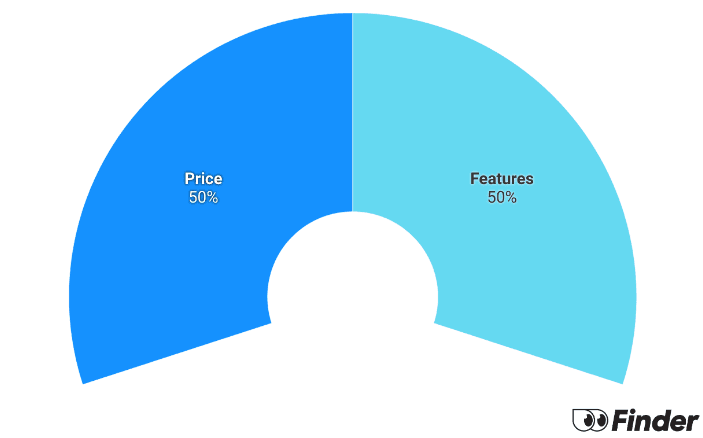Key takeaways
- Health insurance for endodontics is available with mid-tier extras cover.
- Health insurance with endodontic cover starts at around $3 a week.
- Claim limits for endodontics are often combined with other dental services.
Compare health insurance with endodontics cover
This table lists some extras policies from Finder partners that cover endodontics. All have a 12-month waiting period before you can claim. All prices are based on a single individual with less than $101,000 income and living in Sydney.
Finder Score - Health Insurance Extras
Each month we analyse over 10,000 extras insurance products and rate each one on price and features. What we end up with is a nice round number out of 10 that helps you compare extras cover a bit faster.
We want to compare apples to apples, not apples to apple pie. It doesn't make sense to compare a top extras policy with coverage for hearing aids and braces against a policy designed only for dental. So we've separated all the extras policies on the market into pools and categories. Once in their pools and categories, each product gets a price score and a features score, which are then combined to give the Final Score.
What is endodontics?
Endodontists is a type of dentistry that deals with issues inside the teeth. This differs from what's covered under general and major dental insurance, as well as orthodontics. Endodontic treatments include:
- Root canals. If the tooth pulp (interior tissue) becomes inflamed or infected, then a root canal may be required. This involves carefully removing the infected tissue, cleaning and disinfecting the area and then resealing the tooth.
- Endodontic retreatment. If a previously-treated tooth suffers a fracture or other damage, it may become reinfected and need endodontic retreatment. This can happen if decay or injury reopens the tooth, an undetected dental issue presents before the first treatment causes problems, or the previous treatment was otherwise incorrectly carried out or not permanently effective.
- Endodontic surgery. This refers to specific procedures like apicoectomy, or root-end resection, which is required when infection persists in the bony area at the end of a tooth following a root canal. There are a variety of endodontic surgery procedures that can be used in this situation, but apicoectomy is the most common.
What types of health insurance cover endodontics?
Both private health funds and Medicare cover endodontic treatments to a certain extent.
Private health insurance
Endodontic procedures are covered by private health funds under extras policies. Limits, waiting periods and whether or not endodontics are actually covered will vary depending on the chosen provider and policy.
General dentistry and basic health insurance policies typically do not offer any cover. Endodontics itself will typically be grouped within a policy in one of three ways:
- Endodontics and periodontics. These are often grouped together.
- Endodontics. It may also be its own distinct category.
- Major dental. Many policies will group endodontics within the major dental category. Some may also have additional categories like “complex dental”, which might cover endodontics instead.
Check your health fund’s benefit schedule to see how endodontics is classified on your policy.
Medicare
The only endodontic-related costs that Medicare will cover are those related to dental radiology. This is when X-rays are used to diagnose dental issues. Endodontic treatments themselves are not covered by Medicare.
Can I get dental-only health insurance?
Some health insurance funds may also offer dental-only insurance policies. These will only cover dental procedures and will cost a lot less than standard hospital or extras policies. This can be useful if you are interested in finding a health insurance plan that only covers dentistry, or if you have extensive oral surgery needs (like wisdom teeth removal) and ongoing dental health requirements.
- Dental-only plans typically offer high levels of cover for general dentistry such as check-ups and plaque removal.
- The insurer may categorise endodontics as major dentistry, as “endodontics and periodontics”, or as a separate endodontics group. Alternatively, they might only list specific procedures, such as root canals, which are covered.
- Dental-only health insurance policies typically cost less than most extras plans.
- As with other policies, you may be able to select different types of dental-only health insurance, ranging from basic to comprehensive.
- Because they are used for specific purposes, it is not uncommon for dental-only policies to have up to a 12-month waiting period for certain dental procedures. The same is true of many health insurance extras plans.
A complete extras plan rather than a dental-only policy will typically be more cost-effective if you intend to claim for things other than dental procedures, or if you want to be able to claim for more unexpected health issues and treatments.
What to be aware of when comparing policies
Extras policies cover important things that Medicare doesn’t. Endodontic treatments are a perfect example of this. When comparing extras insurance, look for the following features:
- Waiting periods. This is the minimum amount of time you must wait between taking out a policy and being able to claim benefits with it. For endodontics and other major dental procedures, this is typically 12 months with most policies.
- Limits. This is the most you can claim for either certain treatments, such as endodontics, or for certain categories of treatments, such as major dental or all dental. The main limit to consider is the annual amount per person. There may be separate limits for families all under the same policy, sub-limits that apply to certain treatments or types of treatments and lifetime limits that apply for the entire lifespan of the policy.
- Exclusions. These are conditions under which you cannot claim benefits. Exclusions could include certain causes of damage, such as not following the advice of your dentist, being treated by someone who is not a registered practitioner, or receiving treatment outside of Australia.
- Required dental cover. If you are looking for a health insurance policy that covers endodontics in particular, then you should pay close attention to how it is categorised. Endodontics will typically fall into the major dental category, but it might also be separate.
- Extras only: $44
- Basic: $105
- Bronze: $152
- Silver: $179
- Gold: $260
Compare health insurance in just a few clicks
FAQs
More guides on Finder
-
Tooth filling cost in Australia
Learn about the tooth filling types, procedure and costs. Discover how your private health insurance can help cover the expense and save you money.
-
How much do veneers cost in Australia?
Find out how much veneers cost in Australia and how you can avoid being hit with a big bill.
-
How much is a tooth extraction?
Have you been putting off that niggling tooth pain? See how much it costs to have your tooth extraction on public vs private.
-
Dental implants
Your guide to dental implants, including implant types, cost and insurance cover.
-
How much does a Root Canal cost in Australia?
How much does root canal therapy cost and what can you expect from the procedure? Find out here.
-
How much does wisdom teeth removal cost?
Need to have your wisdom teeth removed? Find out how much it will cost in this handy guide.
-
Does Medicare cover dental treatment?
Most general dental treatments are not covered by Medicare unless you are an eligible patient, usually with a concession card.
-
Major Dental Insurance
finder.com.au outlines how the private and public health system in Australia handles major and complex dental procedures.
-
Health insurance for orthodontics
If you want that perfect smile, you need to be aware of what your private health fund offers you.


